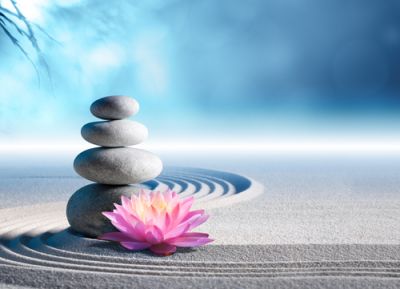 Before you groan and go, “Oh great, another hippy-dippy, feel-good, I’m-okay-you’re-okay lecture about the value of self-centeredness,” stop right there. Zen principles definitely have everything to do with self, but they’re not self-centered as we usually tend to equate that word with egotistical.
Before you groan and go, “Oh great, another hippy-dippy, feel-good, I’m-okay-you’re-okay lecture about the value of self-centeredness,” stop right there. Zen principles definitely have everything to do with self, but they’re not self-centered as we usually tend to equate that word with egotistical.
While Zen principles have their basis in Buddhism, Zen itself is neither a religion nor a belief system per se. Nor is it knowledge per se. Rather, Zen is a way of life, one that leads to your greater happiness and satisfaction with life.
From Within, Not From Without
Over the millennia, numerous philosophers and others have espoused the idea that happiness is the ultimate purpose of life. Even assuming that’s true, it’s not enough to simply “know” it and do nothing about it. First you must decide exactly what happiness is — and what it isn’t. For instance, do the following things really make you happy?
- Getting a promotion
- Getting a raise
- Getting 100 new Facebook friends
- Buying a new car
- Buying the latest designer jeans
- Taking a vacation
- Attending the Super Bowl
It’s easy to say, “yes, all these things make me happy,” and to some extent they do, if only temporarily. But do they actually change your life?
Think about it. You are not your job. You are not your bank account. You are not your car, or your clothes, or the places you go, or the things that you do. While everything on the above list may enhance your life somewhat, if you were a basically unhappy person before they occurred, you likely will still be an unhappy person once the newness of them wears off.
Things cannot and do not make you happy. Only you can make you happy.
It’s a Process
According to the Zen way of thinking, happiness is not the what, it’s the how. It’s the process by which you go about finding true, lasting happiness in your life. After all, nothing much actually happens when you achieve a goal. You still have to keep on keeping on.
Or, to quote Wu Li, a noted Zen-influenced Chinese landscape painter, poet, and calligrapher, “Before enlightenment, chop wood and carry water. After enlightenment, chop wood and carry water.”
The Japanese Zen Master Dogen put it another way: “If you are unable to find the truth right where you are, where else do you expect to find it?”
British philosopher Alan Watts, credited with spreading Zen thinking to the Western world, put it yet another way: “The meaning of life is just to be alive. It is so plain and so obvious and so simple. And yet, everybody rushes around in a great panic as if it were necessary to achieve something beyond themselves.”
Meditate Your Way
“Thinking Zen” requires some form of meditation. It also requires focus and the banishment of distractions. Zen Buddhist monks attempt to achieve happiness, enlightenment, and peace through traditional meditation practices. But you don’t need to sit cross-legged on the floor chanting or humming in order to meditate. Use whatever methodology works for you, such as the following:
- Run or do some other type of formal exercise.
- Take a walk, preferably in the woods, along a beach, etc.
- Gaze at a particularly beautiful or restful landscape, even if it’s only a painting or photograph of the real thing.
- Daydream.
All you need for meditation are a clear mind, no distractions, and a focus on living in the now. Given today’s frantic lifestyle, it may take you several minutes to stop your mind from going over your to-do list or staying bogged down in the minutia of day-to-day living. Be patient. Even meditation is not a goal to achieve; it’s a process of training yourself to live in the moment. Once you discover you can meditate and your best way to do it, you’ll likely meditate more.
Remember, you don’t need to do groundbreaking things in order to live a meaningful life. You only need to live. Really live.



